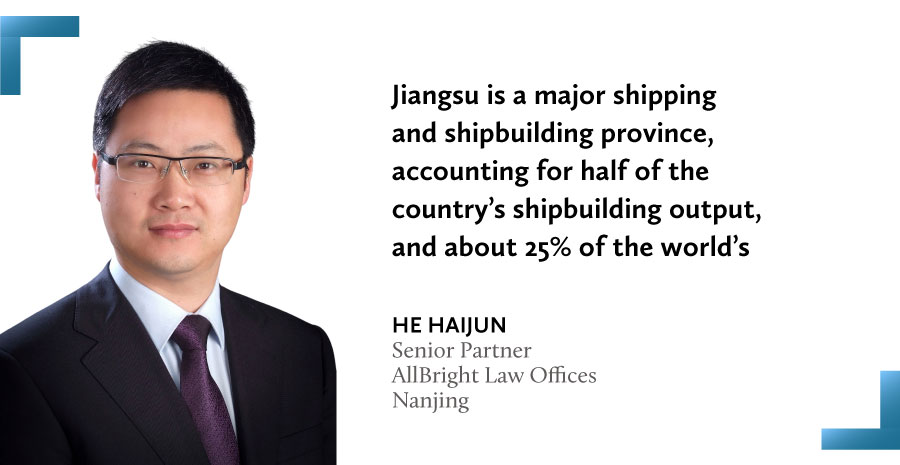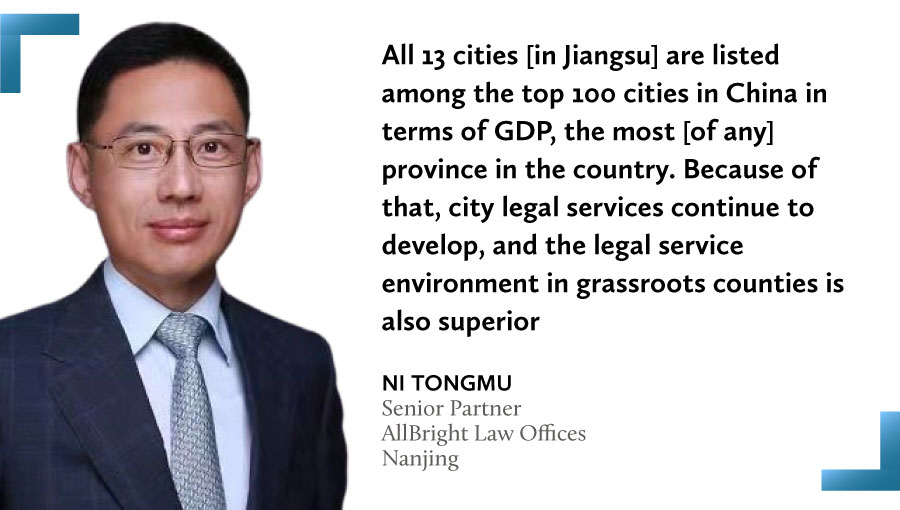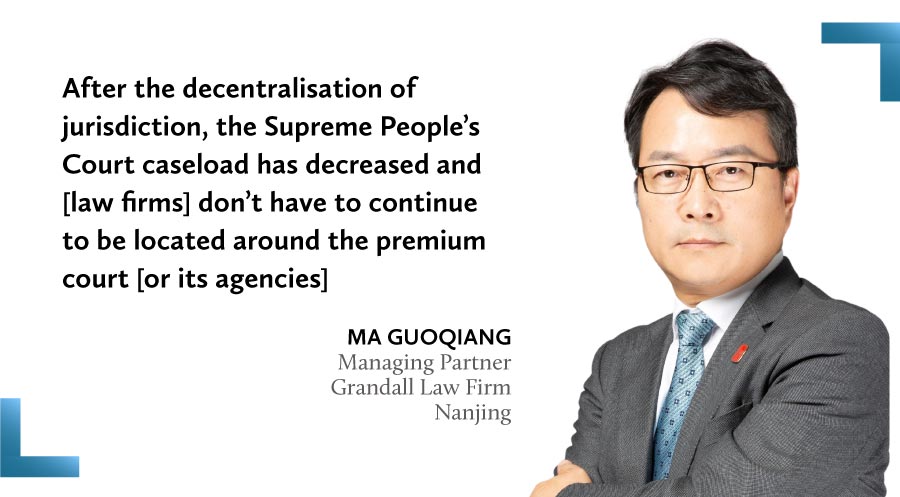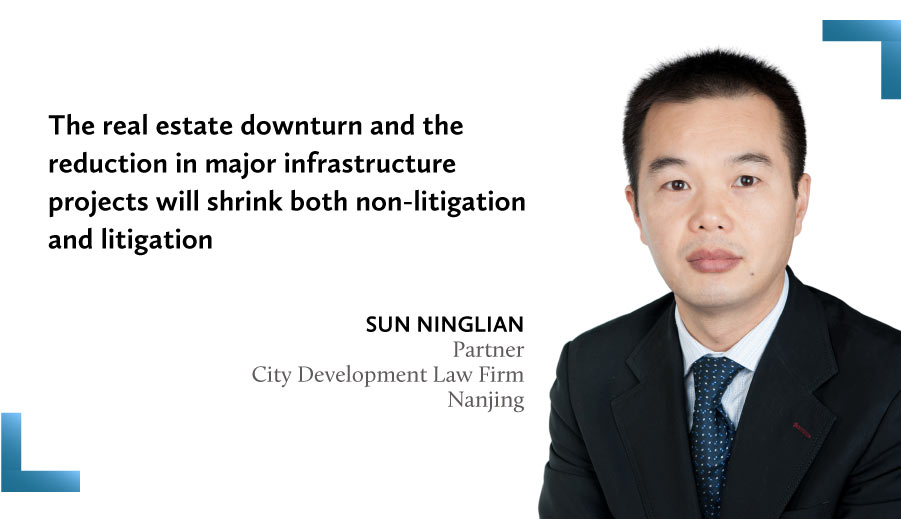A business advantage provided by the Third Circuit Court of the Supreme People’s Court has lost momentum, prompting Jiangsu to seek new avenues to maintain its legal market position in line with its economic dominance. Winny Zhang reports.
Jiangsu is charting a course to new and untapped legal fields to build on the impetus provided by the Third Circuit Court’s arrival in the province. The Third Circuit Court was established there six years ago as an extension of the Supreme People’s Court, handling litigation cases and establishing the province’s judicial status in the Yangtze River Delta. Its arrival encouraged strong demand for legal services and record growth in lawyer numbers.
But this drive has slowed with changes in China’s court jurisdictions. Consequently, Jiangsu law firms are beginning to look for the next growth point.
For local legal firms, the pharmaceutical, semiconductor and maritime industries offer blue ocean opportunities not yet infested with shark-like competitors.
This blue ocean does not equate to no competition; it is simply an emerging market where law firms may grow faster and make more profit.
Jiangsu, together with Shanghai, Zhejiang and Anhui, make up the Yangtze River Delta, the fastest-growing region in China. Since the regional integration of the delta was elevated to a national strategy in 2018, its four provincial bar associations have started discussing legal market integration and signed a framework agreement for professional co-operation.
To avoid being overshadowed in this integration, Jiangsu is counting on the return of talent, as well as the training of high-end legal elites, to foster a substantial increase in legal business within its boundaries.
Connecting with China’s most buoyant capital market (Shanghai) and most dynamic centre of the digital economy (Zhejiang), Jiangsu is perennially China’s second-largest provincial economy. However, its continued growth potential is often overlooked for those of its neighbours.

Such a booming economy brings vibrant opportunities to the legal market, but also challenges.
National law firms have expanded into Jiangsu, making it difficult for local firms to scale up. This is a problem shared by many regions. Some Jiangsu firms, not afraid to break up existing patterns of interest, have joined forces with other local firms to become bigger and stronger.
However, none of these opportunities, challenges and changes is eternal, leading many to question how long the blue ocean will last, and where the next lies.
EBB AND FLOW
In the Jiangsu legal market, the Third Circuit Court is an advantage that “has greatly enhanced the status of the Nanjing legal services market, making the city become a battleground [that] can’t be lost for large law firms,” says Ni Tongmu, a senior partner at the Nanjing office of AllBright Law Offices.

The Third Circuit Court was officially inaugurated in Nanjing, the capital city of Jiangsu province, in 2016. It has jurisdiction in Jiangsu, Shanghai, Zhejiang, Fujian and Jiangxi, which has enabled Jiangsu’s leap to the forefront of justice.
The effect of the Third Circuit Court’s arrival in the years since:
-
- In 2017, 11 Beijing or Shanghai-headquartered law firms set up branches in Nanjing;
- In 2018, there was a 21.8% year-on-year increase in lawyers in Jiangsu, far outpacing Shanghai (16.9%), Guangdong (15.9%) and Beijing (10%); and
- In 2019, Jiangsu became the third area, after Guangdong and Beijing, to exceed 30,000 lawyers.
As a result, Jiangsu’s legal market was spirited. But after five years of being boosted by the Third Circuit Court’s arrival, the benefits have begun to slow.
“The main reason is that the jurisdictional amount [threshold] of a case in the [regional] courts in China has increased substantially,” explains Ma Guoqiang, managing partner and head of the Nanjing office of Grandall Law Firm, which is one of the largest law firms in Nanjing.
The Supreme People’s Court raised the threshold of the first instance of the High People’s Court to RMB5 billion in 2019. This permits some cases originally under the jurisdiction of the high court to be transferred to the Intermediate People’s Court, while second-instance cases originally under the jurisdiction of the Supreme People’s Court can move down to the High People’s Court.
“The entire second-instance caseload of the Third Circuit Court and even of the Supreme People’s Court has dropped dramatically,” says Ma. “After the decentralisation of jurisdiction, the Supreme People’s Court caseload has decreased and [law firms] don’t have to continue to be located around the premium court [or its agencies].”
The waning business growth hints that the talent structure in Jiangsu needs to be optimised. Wang Feng, the founding partner of TianTong Law Firm and head of its Nanjing office, says: “Jiangsu has a surplus of legal talent in the litigation sector and a shortage in the non-litigation sector. The former leads to low-price competition; the latter lacks the service capacity to raise prices.”
Coupled with a lack of high-end business in Jiangsu, companies will need to reduce their legal services spending to save on financial costs in a post-pandemic era. “This will lead to a bottomless suicide price war between peers, causing a huge impact and challenge to the legal industry,” says TianTong’s Wang.
The development of the legal market follows the footsteps of economic and judicial policies where the baton is passing to the maritime sector. The Jiangsu Provincial Higher People’s Court shows the Nanjing Maritime Court has received a total of 8,406 cases since it was set up in 2019, ranking fourth among the 11 maritime courts in China.
He Haijun, a senior partner at AllBright Law Offices in Nanjing, says: “Jiangsu is a major shipping and shipbuilding province, accounting for half of the country’s shipbuilding output, and about 25% of the world’s.”
He analyses multiple factors that have propelled Jiangsu’s maritime business, including:
-
- A shortage of crude tankers amid the Russia-Ukraine war, which has led to an increase in the construction of such vessels;
- A new domestic energy policy that supports new energy vehicle exports, which has beefed up roll-on/roll-off vessels; and
- The high cost of deep-sea floating wind power platforms, at more than RMB1 billion each.
He also believes the significance of the International Commercial Tribunal should not be underestimated. In 2020, Suzhou, the second-biggest city in Jiangsu, took the lead in setting up the country’s first prefecture-level international commercial court, followed by another city, Wuxi, and three local free-trade zones also setting up primary people’s courts. As of 2022, the five courts had adjudicated cases across 143 countries and regions, with judgments recognised and enforced in the US, Australia, Ethiopia, etc.
The above-mentioned layout has laid the foundation for the province’s 14th Five-Year Plan of the legal industry, produced by the Jiangsu justice department. The plan demands that the development of lawyers be in line with the context of economic development, with efforts to cultivate “sector champions” in intellectual property, finance and securities, maritime and commerce, and professional talent for foreign-related services.
Jingtian & Gongcheng’s Wang Feng, a partner and head of the firm’s Nanjing office, believes that now is a good time for local firms to reel in the legal elite.
“Localised services were valued higher by local clients during the pandemic lockdown period, a tendency that perhaps will last afterwards. We can see it as an opportunity for the return of Jiangsu talent from Beijing and Shanghai,” says Wang.
ECONOMIC DRIVE
Insolvency and restructuring have become particularly active in the past three years as the pandemic has interrupted the growth momentum of China’s open-door policy. The Jiangsu legal market shares this opportunity with other legal markets, yet has its own focus – the real estate sector.
Sun Ninglian is a partner and head of the Nanjing office at City Development Law Firm, which specialises in construction legal services. Sun says there has been a significant increase in contract disputes between real estate developers and construction companies caused by property purchase restrictions and loan restrictions overlaid with the “three red lines”, a framework to deleverage the real estate industry, making developers’ cash flows dry up quickly and leaving some unable to make payments.
You must be a
subscribersubscribersubscribersubscriber
to read this content, please
subscribesubscribesubscribesubscribe
today.
For group subscribers, please click here to access.
Interested in group subscription? Please contact us.























